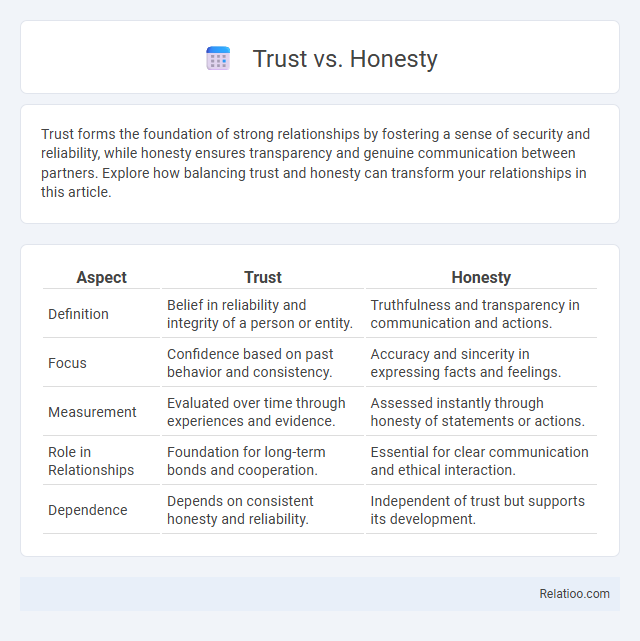Trust forms the foundation of strong relationships by fostering a sense of security and reliability, while honesty ensures transparency and genuine communication between partners. Explore how balancing trust and honesty can transform your relationships in this article.
Table of Comparison
| Aspect | Trust | Honesty |
|---|---|---|
| Definition | Belief in reliability and integrity of a person or entity. | Truthfulness and transparency in communication and actions. |
| Focus | Confidence based on past behavior and consistency. | Accuracy and sincerity in expressing facts and feelings. |
| Measurement | Evaluated over time through experiences and evidence. | Assessed instantly through honesty of statements or actions. |
| Role in Relationships | Foundation for long-term bonds and cooperation. | Essential for clear communication and ethical interaction. |
| Dependence | Depends on consistent honesty and reliability. | Independent of trust but supports its development. |
Introduction: Defining Trust and Honesty
Trust represents the firm belief in the reliability and integrity of a person or entity, forming the foundation of all successful relationships. Honesty, the practice of being truthful and transparent, serves as a critical component in establishing and maintaining trust. Clear and open communication facilitates the expression of honesty, reinforcing trust by enabling mutual understanding and accountability.
The Core Differences Between Trust and Honesty
Trust involves believing in someone's reliability and intentions based on past behavior, while honesty is about presenting facts truthfully and transparently. Communication bridges both by conveying honest information that builds or reinforces trust over time. The core difference lies in trust being an emotional confidence in someone's character, whereas honesty is a straightforward expression of truth.
Why Honesty Doesn’t Always Guarantee Trust
Honesty establishes a foundation for transparency but does not always guarantee trust because trust also depends on consistency, reliability, and emotional understanding. Individuals may be honest yet lack empathy or fail to follow through on commitments, causing others to question their trustworthiness. Effective communication that demonstrates accountability and respect strengthens trust beyond mere honesty.
The Role of Consistency in Building Trust
Consistency plays a crucial role in building trust by reinforcing reliability and predictability in actions and communication. When honesty is paired with consistent behavior, it strengthens credibility and fosters a secure environment for open dialogue. Reliable communication patterns ensure that trust is maintained over time, creating a solid foundation for authentic relationships.
How Context Influences Trust and Honesty
Trust and honesty are deeply influenced by contextual factors such as cultural norms, past experiences, and situational dynamics, which shape how individuals perceive and value truthful communication. In high-stakes environments like business or healthcare, transparency and reliability reinforce trust, whereas ambiguous contexts may breed skepticism and test honesty. Effective communication tailored to the context fosters mutual understanding, enabling people to align their expectations and build authentic trust over time.
Trust Without Complete Honesty: Is It Possible?
Trust can exist without complete honesty when transparency is balanced with discretion, allowing relationships to function despite partial truth. Psychological studies highlight that perceived reliability and consistent behavior often strengthen trust more than absolute disclosure. However, sustained trust typically requires critical honesty as repeated omissions or deceit undermine relational integrity and long-term confidence.
The Impact of Broken Trust vs. Broken Honesty
Broken trust often leads to deep relational fractures that hinder cooperation and emotional security, while broken honesty primarily damages credibility and transparency between parties. Trust is foundational for long-term relationships, making its breach more difficult to restore compared to isolated instances of dishonesty, which can sometimes be repaired through clear communication and accountability. The impact of broken trust generally results in lasting skepticism and reduced willingness to engage, whereas broken honesty tends to create specific moments of doubt that can be addressed through open dialogue.
Rebuilding Trust After Dishonesty
Rebuilding trust after dishonesty requires consistent honesty and open communication to repair the emotional damage caused. Your commitment to transparent dialogue and accountability demonstrates sincerity, helping to restore faith over time. Trust grows when actions align with words, reinforcing the foundation of any relationship through reliable and truthful interaction.
Cultivating a Balance: When to Prioritize Trust or Honesty
Cultivating a balance between trust and honesty requires recognizing situations where maintaining trust preserves relationships while honesty ensures transparency. You should prioritize trust when fostering emotional security is essential, yet honesty becomes crucial when addressing critical issues that impact mutual understanding. Effective communication acts as the bridge, enabling you to navigate these nuances thoughtfully and maintain relational harmony.
Conclusion: Integrating Trust and Honesty for Stronger Relationships
Integrating trust and honesty forms the foundation of stronger relationships by fostering genuine connections and open communication. Your ability to consistently demonstrate honesty encourages trust, which in turn enhances mutual understanding and reduces conflicts. Prioritizing both elements creates a communication dynamic that supports lasting, meaningful interactions.

Infographic: Trust vs Honesty
 relatioo.com
relatioo.com